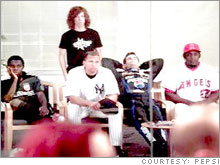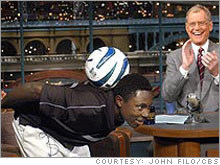 |
| Sixteen-year old Freddy Adu, right, has already appeared in a national commercial with some of the nation's most marketable athletes. |
|
 |
| Adu was appearing on Letterman at age 14, before his first minute of pro soccer. |
|
|
|
|
|
NEW YORK (CNN/Money) -
They are the dream team, or rather dream teens, for advertisers.
The National Basketball Association's LeBron James. Tennis star Maria Sharapova. Golfer Michelle Wie. The National Hockey League's Sidney Crosby. And Major League's Soccer Freddy Adu.
All were signing multi-million dollar endorsement deals while they were teenagers, James, 20, is the only one to have aged out of his teens already.
And all except Sharapova had those deals before they had played one second of professional athletics. Competitors such as Nike and Reebok, Coca-Cola and Pepsi are eager to place their bets on their future potential as early as possible.
The member of this group who struck marketing gold at the youngest age is Adu.
An incredibly poised and articulate youngster, Adu signed his first pro contract in 2003 at age 14, heralded as the Michael Jordan of his sport who would help MLS finally live up to its name as a big-time sport.
He appeared on David Letterman, and signed deals with Nike, Pepsi and other sponsors that dwarfed deals seen by any other U.S. soccer player. An estimate from Sports Illustrated puts his annual income at $3 million, with only $500,000 of that coming from MLS.
He appeared in a Pepsi commercial earlier this year with some of the most marketable athletes in the world of U.S. sports, including Nascar driver Jeff Gordon and Yankee third baseman Alex Rodriguez.
When his DC United team made it to the MLS Cup in 2004, his celebrity helped spur more than a 20 percent jump in viewership, even though he didn't start the game.
But as Adu's league holds its championship outside of Dallas this weekend, the recent speed-bump in the 16-year old wunderkind's career shows the risks that go with sponsors throwing such big contracts at such unproven young athletes.
Adu started only 16 of the 25 games he played this season. And when he complained about his playing time at the end of this season and suggested he might want to play on a different team next season, the team suspended him for the first game of the playoffs.
DC United was eliminated in the next playoff game. And while nothing is yet determined, at the moment it now appears that Adu will not be on the U.S. National Team that plays in the World Cup next year.
Still Adu's agent, his sponsors and marketing experts suggest that even with the young star's first taste of bad PR, his endorsement potential remains as strong as ever.
"We've got a long-term relationship with Freddy," said Nike spokesman Dean Stoyer. "Entering an endorsement relationship with a young athlete who has not yet reached his or her potential does pose some questions about what their potential could be. Nike is proud to consider Adu among its athletes now and for years to come. He is still a great voice for us in terms of building the game in the U.S."
Stoyer and Adu's agent, Richard Motzkin, said the endorsement deal is a good one even if Adu is not on the World Cup team next year.
"None of his marketing partners ever signed on with the assumption he'd be on next year's World Cup team," said Motzkin, who pointed out that few teens have ever made any World Cup team.
Part of the reason that Adu and the other young stars might be finding more success off the field than on the field at this point in their career is their popularity among their own age group, said David Carter, executive director of University of Southern California's Sports Business Institute. Those are prime consumers for advertisers because they are just now forming their brand preferences that can last decades if not a lifetime, he said.
"Is there risk if they don't live up to the hype? Yes. But there's dramatic upside if you can convince someone who is 13 or 14 to start wearing your shoes or get their parents to get them your cell phone because of that endorsement," said Carter.
He said that if the young player starts finding success on the field, the court or the ice, it's just a bonus because that increases their appeal with the older fans. "Athletic achievement helps you transcend the demographics," he said. But that traditional measure of success in sports -- being a winner -- isn't crucial for connecting with the teenagers the advertisers want.
This is confirmed by a survey by Marketing Evaluations, which does the Q score ratings used by sponsors to judge a athlete or actor's appeal. Adu's popularity with sports fans 12-17 years old is better than twice his popularity with older fans.
So you won't see Freddy Adu in this weekend's MLS Cup and you probably won't see him in the World Cup matches next year. But don't be surprised if you see a lot more of him, and the other teen superstars, on commercials for years to come, no matter their athletic success.
For more on Freddy Adu's business potential, click here.
For more on the business of sports, click here.

|